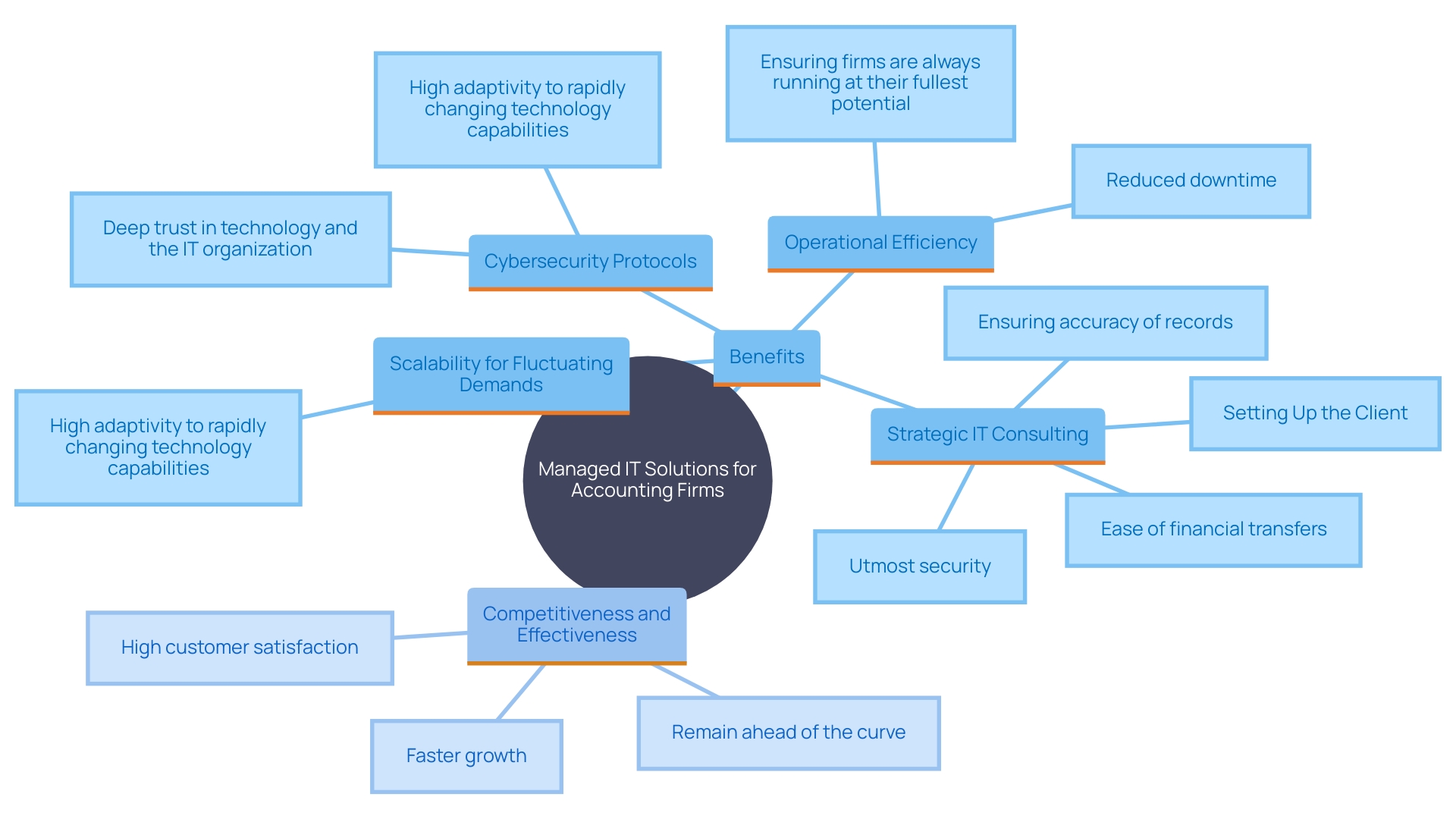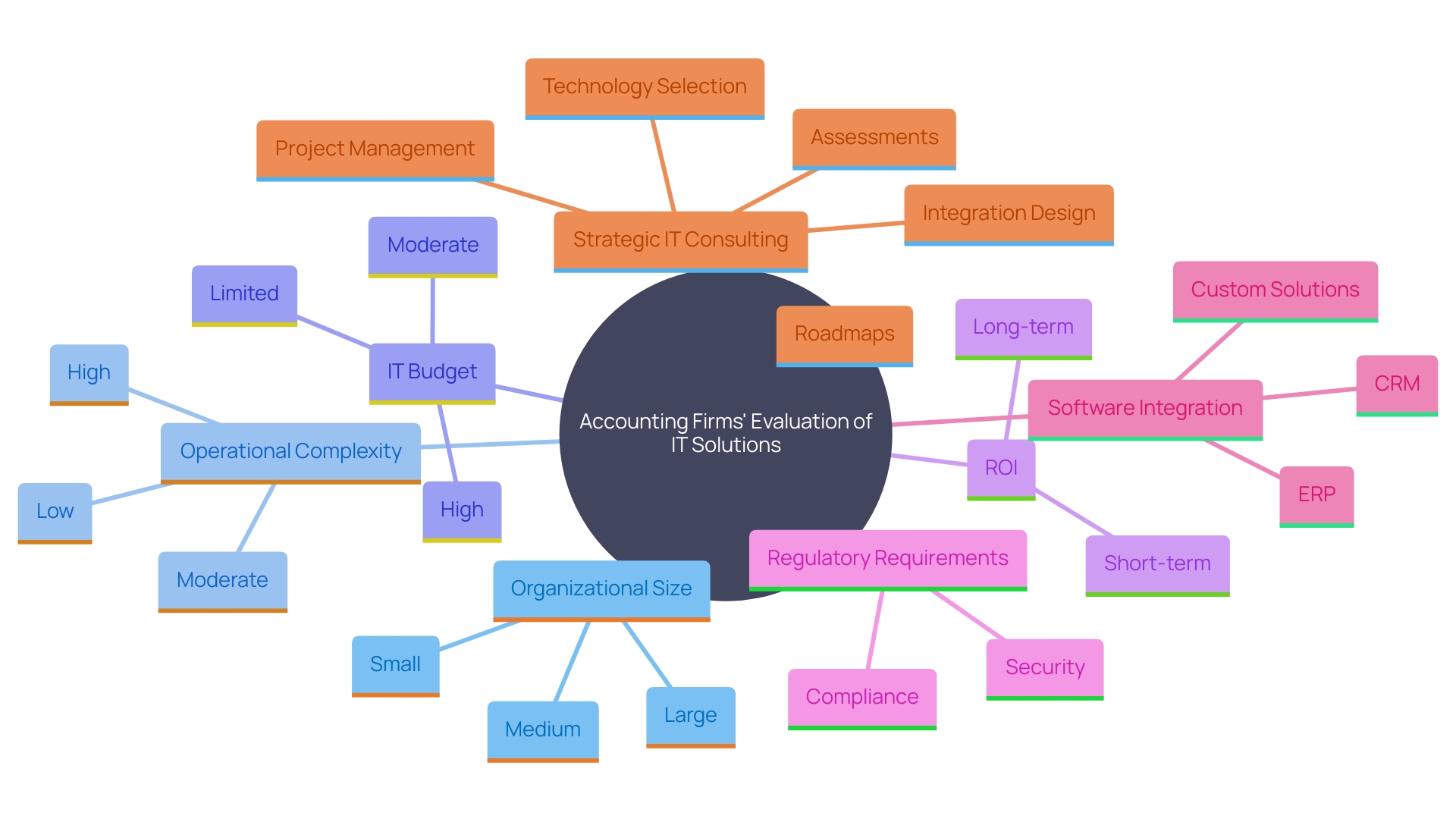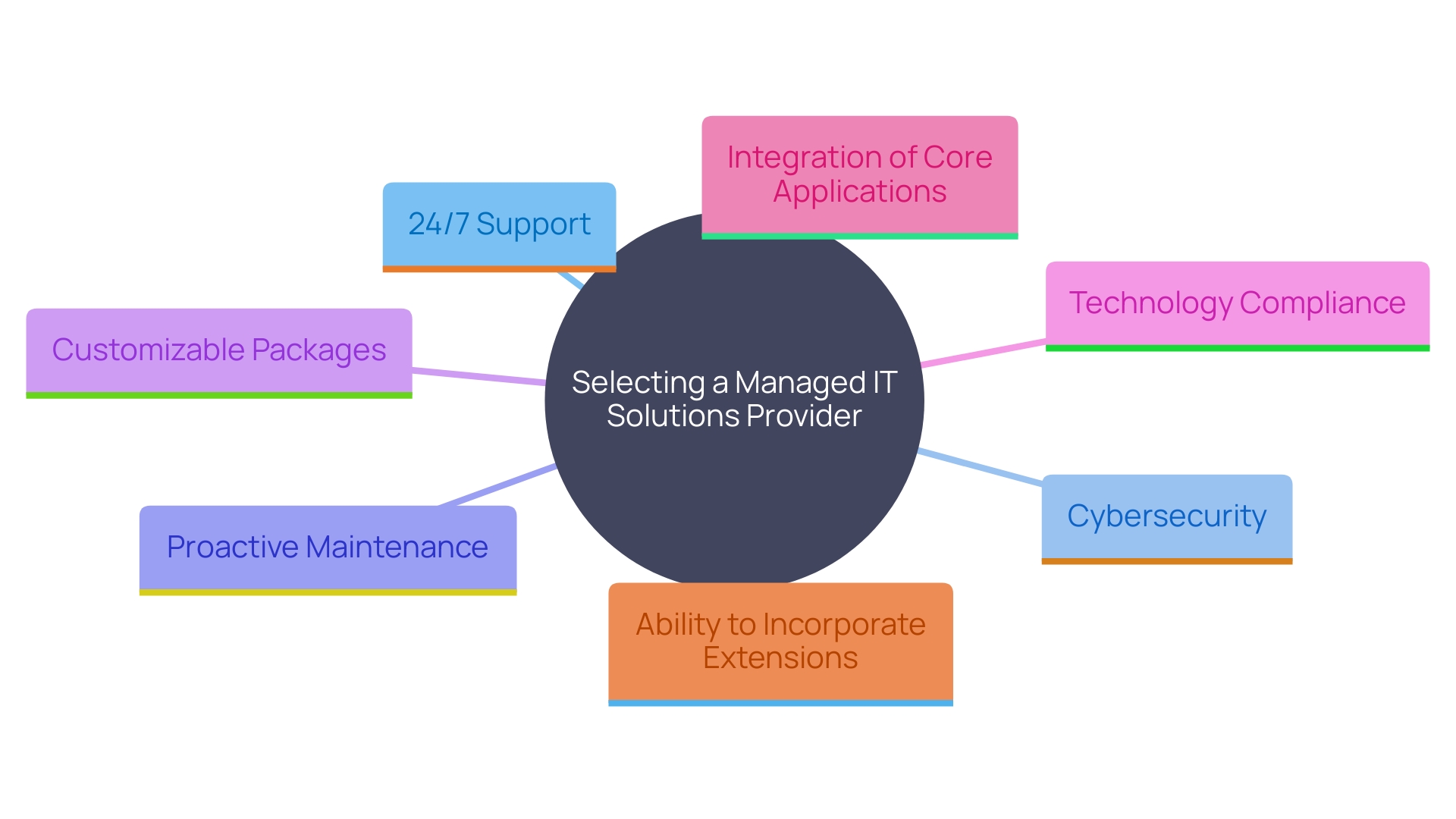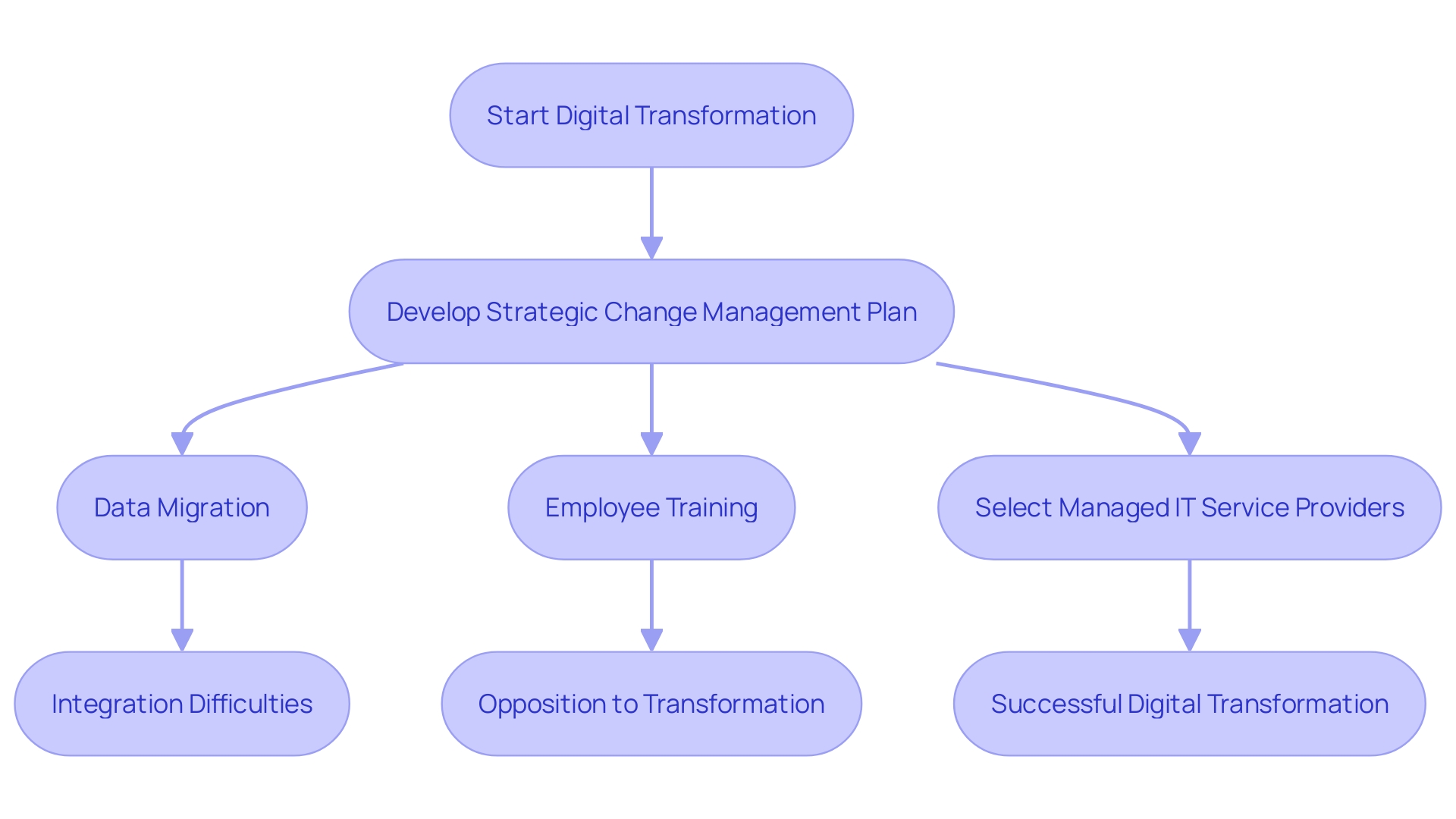Introduction
In today's dynamic financial environment, accounting firms face the dual challenge of protecting sensitive data and maintaining operational efficiency. Managed IT services present a comprehensive solution by providing robust cybersecurity measures to guard against sophisticated cyber threats while enabling firms to scale their IT resources according to fluctuating demands. These services not only minimize downtime and ensure systems remain updated but are also crucial for compliance and timely client service delivery.
As the financial landscape rapidly evolves, seamless integration between vendor and client systems becomes essential for accuracy and security in financial transactions. Managed IT services facilitate this integration, thereby maintaining flawless communication and operational continuity. Furthermore, strategic IT consulting embedded within these services offers long-term planning and optimization, enabling firms to reduce costs and compete effectively with larger enterprises by leveraging advanced IT infrastructure.
With the IT services market in Europe poised for significant growth, accounting firms must adopt managed IT services to stay competitive. This growth highlights the necessity for firms to navigate increasing demands and technological advancements efficiently, ensuring they operate at their fullest potential in a highly competitive market.
Benefits of Managed IT Services for Accounting Firms
Managed IT solutions provide accounting businesses with strong cybersecurity protocols, protecting confidential financial information from constantly changing cyber dangers. These solutions provide scalability, enabling firms to efficiently adjust their IT resources to align with fluctuating demands. Furthermore, organized IT solutions improve operational efficiency by reducing downtime and guaranteeing that systems are regularly updated, which is essential for adhering to compliance standards and providing prompt client assistance.
In the rapidly changing financial landscape, staying ahead means adopting software that evolves swiftly. Managed IT solutions provide the infrastructure for seamless integration between vendor and client systems, ensuring accuracy and security in financial transactions. This integration is vital for maintaining flawless communication and operational continuity.
'Strategic IT consulting within supported operations provides expertise for long-term IT planning and optimization, lowering costs by removing the requirement for dedicated IT personnel and related expenses.'. The capability to incorporate extensions via vendor marketplaces further guarantees that businesses operate at their fullest potential, competing effectively with larger companies.
As the IT solutions market in Europe is expected to expand considerably, financial organizations must utilize supervised IT offerings to stay competitive. This growth highlights the need for companies to embrace these solutions to manage the rising demands and technological progress in the sector effectively.

Key Considerations Before Investing in Managed IT Services
Prior to engaging in supervised IT solutions, accounting companies must carefully assess their particular requirements and strategic goals. The organization's size, operational complexity, and IT budget are critical factors in this assessment. Furthermore, comprehending the possible return on investment (ROI) and how organized solutions can aid in achieving long-term business objectives is crucial. It's worth mentioning that managed services can significantly reduce costs, particularly for smaller companies, as they can eliminate the need for dedicated IT staff and associated expenses.
Additionally, companies should take into account the regulatory requirements specific to the financial sector. The capacity to merge and enhance accounting software via vendor marketplaces, which provide various choices, guarantees that businesses function at peak efficiency. The expansion of the SaaS sector has brought enterprise-level characteristics into software for small and medium-sized companies, enabling them to compete with bigger competitors.
Strategic IT consulting can offer valuable guidance for long-term IT planning and optimization, helping firms navigate the complexities of technological advancements. Based on recent market evaluation, the competitive intensity in the IT sector is high, fueled by swift technological advancements and the growing demand for advanced data analytics and automation. This highlights the significance of choosing a support partner that can offer secure, compliant, and high-performing solutions customized to the financial sector's requirements.

Features to Look for in a Managed IT Services Provider (MSP)
Choosing the appropriate managed IT solutions provider is vital for financial practices and CPA organizations. Key features to look for include 24/7 monitoring and support, robust cybersecurity measures, and a proven track record in the industry. A proactive approach, as opposed to a break-fix solution, is essential. This involves regular software and hardware updates and maintenance to prevent issues before they arise. Additionally, customizable service packages tailored to the company's specific needs ensure that the IT support aligns perfectly with business objectives.
Ensuring that the provider uses the latest technology and complies with industry standards is vital. According to recent industry reports, 85% of IT executives believe that integration between core applications is crucial for efficiency, and 70% agree that it drives overall effectiveness. Therefore, choosing a provider that offers integrated and automated solutions can save time and money, streamline IT operations, and improve business outcomes.
Additionally, the capability to incorporate extensions into financial software via a vendor’s marketplace guarantees that businesses are consistently operating at their maximum potential. By leveraging these advanced features and technologies, accounting firms can enhance their operational efficiency and focus on their core business activities.

Common Challenges in Implementing Managed IT Services
Executing controlled IT solutions involves multiple obstacles, notably featuring opposition to transformation and integration difficulties. Overcoming these obstacles often requires a strategic approach and a well-thought-out change management plan. For instance, a leading provider of automated testing equipment faced substantial hurdles when its aging IT infrastructure, comprising over 190 applications, necessitated a complete digital overhaul. This example underscores the importance of a structured transition plan to manage the integration of new systems with existing processes effectively.
Data migration also presents significant challenges. It's critical to ensure that data is transferred securely and accurately, which often demands rigorous planning and execution. Moreover, employee training on new technologies is essential to foster a smooth transition. According to Lynn Greiner, an expert with over 20 years of experience in interpreting tech for businesses, “Rapid technological changes and the rise of augmented intelligence (AI) and sophisticated data analytics make it challenging to keep up with the latest automation trends and technologies.”
Organizations should look for managed IT service providers with a proven track record of success, robust security measures, and a comprehensive range of services that align with their specific needs and goals. This method can greatly reduce the difficulties related to moving to overseen IT solutions and guarantee operational efficiency. In the words of a large U.S. financial services company that modernized its application architecture, “Operational efficiency is crucial for streamlining processes, reducing costs, and improving performance.” Adopting a strategic and structured approach to managed IT services can empower organizations to navigate the complexities of digital transformation successfully.

Best Practices for Selecting an MSP
Choosing the appropriate Managed Service Provider (MSP) necessitates comprehensive due diligence, especially for financial organizations and CPA practices. Businesses should begin by interviewing possible suppliers and specifically ask for case studies and references from other financial services companies to assess their experience in the sector. Grasping the MSP’s response time and support capabilities is essential, along with their knowledge of compliance matters relevant to the finance profession.
Establishing clear Service Level Agreements (SLAs) that outline expectations and accountability is essential for a successful partnership. As highlighted by the 2024 MSP Benchmark Survey report, it’s important to delve deep into the industry’s challenges and opportunities to make informed decisions. For instance, while Maps are making significant investments in cybersecurity and risk management, the positive and negative impacts of artificial intelligence (AI) and shifts in work-life balance are ongoing considerations.
A case study from a recognized accounting organization demonstrated the importance of stakeholder communication and collaboration over mere technological solutions. This underscores that, while technology evolves, the primary vehicle for success remains effective communication and partnership. Therefore, ensure your chosen MSP aligns with these principles to drive your firm’s success.
Conclusion
In today's rapidly evolving financial landscape, the adoption of managed IT services has emerged as a critical strategy for accounting firms seeking to enhance operational efficiency and safeguard sensitive data. By integrating robust cybersecurity measures, these services not only protect against sophisticated cyber threats but also facilitate the scalability of IT resources, allowing firms to adapt to fluctuating demands seamlessly. The ability to keep systems updated and compliant is essential in delivering timely client services, thus reinforcing the importance of managed IT services in maintaining competitive advantage.
Moreover, the integration capabilities provided by managed IT services ensure accuracy and security in financial transactions, fostering seamless communication between vendor and client systems. This operational continuity is vital for accounting firms striving to navigate the complexities of modern financial transactions. Additionally, the strategic IT consulting embedded within managed services empowers firms to optimize their IT infrastructure, reducing operational costs and enabling them to compete effectively against larger enterprises.
However, successful implementation requires careful consideration of specific needs, regulatory compliance, and the selection of a provider with a proven track record. Establishing clear expectations and fostering effective communication are pivotal for a fruitful partnership. As the IT services market continues to expand, accounting firms must leverage these insights and best practices to not only adapt but thrive in an increasingly competitive environment, ensuring they remain at the forefront of the industry.




